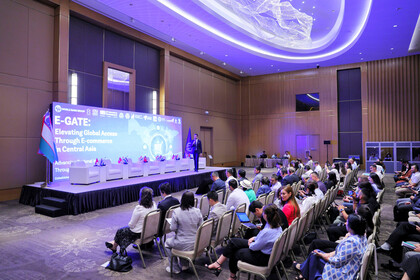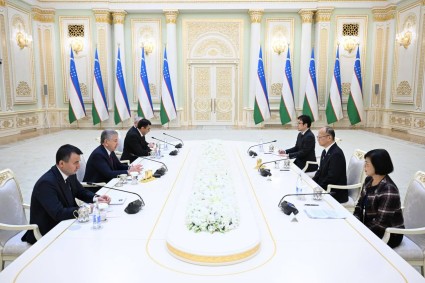A regional conference on the development of e-commerce in Central Asian countries was held in Tashkent. The event was organized by the World Bank in cooperation with the National Agency for Perspective Projects of Uzbekistan. The conference took place under the World Bank’s Elevate Global Access Through E-Commerce (E-GATE) in Central Asia Program.
The conference brought together representatives of relevant ministries and agencies responsible for digital economy development in Central Asia, along with e-commerce and business associations from across the region. Experts from the World Bank Group and specialists from companies such as Alibaba, DHL, Uzum, Lenovo, Jumia, UzPost, and others contributed to the discussions on key topics.
The combined e-commerce market in Kazakhstan, the Kyrgyz Republic, Tajikistan, and Uzbekistan is estimated at around $3 billion. However, it could be significantly larger if existing barriers were removed. Growth is hindered by an underdeveloped internet infrastructure, high logistics costs, limited delivery options, low levels of digital literacy among businesses and the population, and a strong preference for cash payments.
A large share of online sales is conducted informally through social media platforms due to complex tax regulations and restrictions on delivery and payments, which limit the ability of businesses to operate legally. The legislation regulating e-commerce often does not meet the needs of the digital economy or the requirements for consumer protection. In addition, the lack of a unified regional e-commerce market hinders scaling and cross-border cooperation.
The E-GATE Program has been implemented by the World Bank since 2023 in the Kyrgyz Republic, Tajikistan, and Uzbekistan. Its goal is to remove barriers to e-commerce development, create new entrepreneurial opportunities, and integrate local firms into global trade. Strengthening regional cooperation in the digital economy is also a key focus. The program supports both government institutions and the private sector.
The initiative is funded by the UK Foreign, Commonwealth and Development Office (FCDO) and implemented in cooperation with relevant ministries, agencies, and associations responsible for e-commerce and entrepreneurship development in the three countries.
A key objective of the E-GATE Program is to help micro, small, and medium enterprises (MSMEs) in the region access international markets through e-commerce tools and develop the digital skills needed to promote local products on global online marketplaces.
During the conference in Tashkent, participants reviewed the progress of the E-GATE Program and its flagship component focused on supporting local exporters via international marketplaces.
As part of a pilot initiative launched in May 2024, 83 beneficiaries from the three participating countries, firms of various sizes and sectors, were selected through a competitive process to start exporting their products globally via Alibaba.com. More than 30 of these, or about 40%, were MSMEs from Uzbekistan.
E-GATE Program participants received free access to Alibaba.com’s premium membership. More than 70 training sessions were conducted for program beneficiaries, covering topics such as working with online marketplaces, export procedures, marketing, logistics, taxation, postal services, customer relations, export contract negotiations, and other key aspects.
Major outcomes of the E-GATE program include expanded access for regional MSMEs to new markets, the signing of new client contracts globally, and the creation of new jobs, particularly for women, to support growing business operations.
Participants in the E-GATE Program signed or are in the process of signing export contracts totaling more than $23 million. Notably, $16 million of this amount was in trade between Central Asian countries. Participating MSMEs began engaging with buyers in more than 70 new international markets.
For instance, MSMEs from Uzbekistan signed contracts worth around $5 million on Alibaba.com. These included shipments of textile products, nuts, frozen and dried fruits, and other goods. The most popular export destinations included the United Kingdom, the UAE, and New Zealand. The conference also featured success stories from Uzbek firms that achieved notable results through the program.
Experts also discussed next steps for advancing e-commerce in Central Asia and enhancing the region’s integration into global trade. Particular attention was paid to improving logistics services to accelerate exports to third countries, as well as to expanding opportunities for women and youth to participate in the e-commerce sector.
On the sidelines of the conference, representatives of e-commerce associations from Uzbekistan, the Kyrgyz Republic, and Tajikistan signed a Memorandum of Understanding. The document outlines plans to develop strategic cooperation in the field of e-commerce, including joint efforts to expand employment in the sector, improve the regulatory framework and digital infrastructure, and create favorable conditions for cross-border trade.












